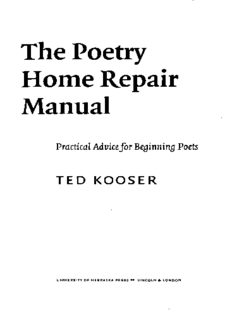
The Poetry Home Repair Manual: Practical Advice for Beginning Poets PDF
Preview The Poetry Home Repair Manual: Practical Advice for Beginning Poets
The Poetry Home Repair Manual Practical Advice for Beginning Poets TED KOOSER UNIVERSITY OF NEBRASKA PRESS •» LINCOLN & LONDON Acknowledgments for previously published material appear on pages 159-63, which constitute an extension of the copyright page. © 2005 by the Board of Regents of the University of Nebraska. All rights reserved. Manufactured in the United States of America © Library of Congress Cataloging-in- Publication Data Kooser, Ted. The poetry home repair manual: practical advice for beginning poets / Ted Kooser. p. cm. Includes bibliographical references. ISBN 0-8032-2769-8 (cl.: alk. paper) 1. Poetry—Authorship. I. Title. PN1059.A9K66 2005 8o8.i-dc22 2004024700 Charles Levendosky, poet and citizen 1936-2004 CONTENTS Acknowledgments ix About This Book xi 1 A Poet's Job Description 1 2 Writing for Others 19 3 First Impressions 25 4 Don't Worry about the Rules 35 5 Rhyming, Ham Cubes, Prose Poems 45 6 Writing about Feelings 55 7 Can You Read Your Poem through Your Poem? 65 8 Writing from Memory 73 9 Working with Detail 93 10 Controlling Effects through Careful Choices 111 11 Fine-Tuning Metaphors and Similes 125 12 Relax and Wait 147 Source References and Acknowledgments 159 ACKNOWLEDGMENTS Special thanks to my wife, Kathleen Rutledge, expert editor and wise counsel. My gratitude to Susan Aizenberg, Steve Cox, Susan Firer, George Garrett, Jeff Gundy, Bob King, Jeff Daniel Marion, Linda Parsons Marion, David Mason, Leonard and Carol Nathan, Luan Pitsch, Christine Stewart-Nunez, and Don Welch, who read the manuscript and provided helpful comments. Thanks also to my editor, Ladette Randolph, and her continuing generosity toward my writing. Thanks also to my students at the University of Nebraska, whose efforts to write poetry have shaped some of what I offer in these pages. ABOUT THIS BOOK Most of a poet's education is self-education, and most of what you'll learn you'll teach yourself through reading and writing poems. A good teacher may be able to nudge you along, may assign exercises like the how-to poem or the poem-in-answer-to-a-question, but eventually you'll get tired of doing literary sit-ups and knee bends and grow impatient to write the poems you really want to write, poems you feel inside you, poems like those you find in the books of writers you admire. But the craft of careful writing and meticulous revision can be taught. The Poetry Home Repair Manual can assist you in making your poems stronger and more effective in finding an audience. I've been writing and publishing poetry for more than forty years, and in these pages I offer you some of my favorite tools for tuning up the poems you write. I'm confident you'll find them useful. This is only one of many books about poetry writing. It's not very lengthy because there's only so much I know. I've learned a lot about writing poems, but I'll never get to the end of all the poetry still to be learned from, never make all the discoveries I'd like to make. You'll find I pay lots of attention to a poet's relationship with readers. If you've gotten the impression from teachers or from reading contemporary poetry that poets don't need to write with a sense of somebody out there who might read what they've written, this book is not for you. Poetry is communication, and every word I've written here subscribes to that belief. Poetry's purpose is to reach other people and to touch their hearts. If a poem doesn't make sense to anybody but its author, nobody but its author will care a whit about it. That doesn't mean that your poems can't be cryptic, or elusive, or ambiguous if that's how you want to write, as long as you keep in mind that there's somebody on the other end of the communication. I favor poems that keep the obstacles between you and that person to a minimum. My approach is open to argument, of course, but even if you disagree with me on every page, even if I make you angry, I'm pretty sure you'll take away something worthwhile from what you find here. My writing philosophy owes much to an idea that Lewis Hyde expresses in his book The Gift: Imagination and the Erotic Life of Property. He suggests that those who are gifted should give something back. With Hyde's thought resounding in my head and my own need to feel useful, I've shaped my own philosophy of writing, in particular a belief that people who have the ability to write have an obligation to offer something of use to their chosen readers. I emphasize chosen readers; later in this book I'll talk at length about the process of choosing your audience through the use of imaginary readers. Throughout this book I cite examples of poems. Nearly all of these were written in recentyears. There's much to be said in favor of studying the poetry of the past, but I want to direct your attention to poems being written today. It's the nou; of poetry you plan to enter, offering your own poems. The poet John Ciardi once said that whenever in time, and wherever in the universe, any person speaks or writes in any detail about the technical management of a poem, the resulting irascibility of the reader's response is a constant. I hope I won't exhaust your patience. xii •• AboutThisBook
Description: